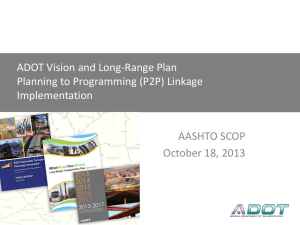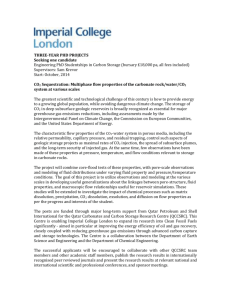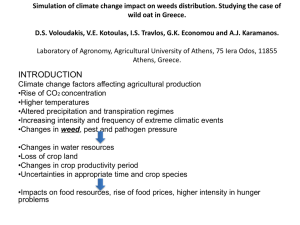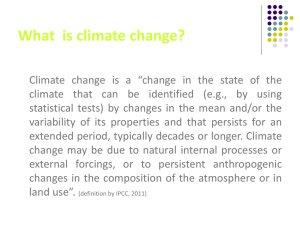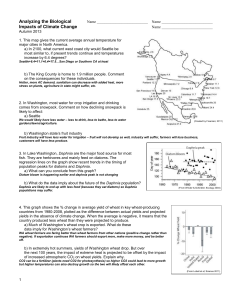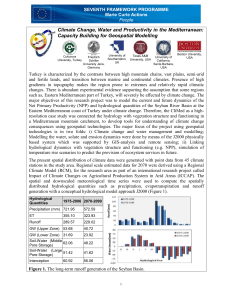2014 National Priority Plan - The National Economic and
advertisement
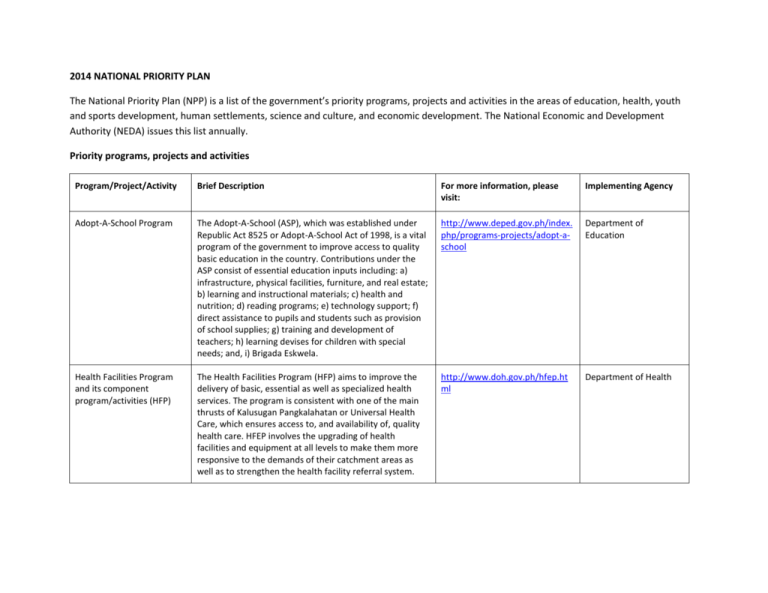
2014 NATIONAL PRIORITY PLAN The National Priority Plan (NPP) is a list of the government’s priority programs, projects and activities in the areas of education, health, youth and sports development, human settlements, science and culture, and economic development. The National Economic and Development Authority (NEDA) issues this list annually. Priority programs, projects and activities Program/Project/Activity Brief Description For more information, please visit: Implementing Agency Adopt-A-School Program The Adopt-A-School (ASP), which was established under Republic Act 8525 or Adopt-A-School Act of 1998, is a vital program of the government to improve access to quality basic education in the country. Contributions under the ASP consist of essential education inputs including: a) infrastructure, physical facilities, furniture, and real estate; b) learning and instructional materials; c) health and nutrition; d) reading programs; e) technology support; f) direct assistance to pupils and students such as provision of school supplies; g) training and development of teachers; h) learning devises for children with special needs; and, i) Brigada Eskwela. http://www.deped.gov.ph/index. php/programs-projects/adopt-aschool Department of Education Health Facilities Program and its component program/activities (HFP) The Health Facilities Program (HFP) aims to improve the delivery of basic, essential as well as specialized health services. The program is consistent with one of the main thrusts of Kalusugan Pangkalahatan or Universal Health Care, which ensures access to, and availability of, quality health care. HFEP involves the upgrading of health facilities and equipment at all levels to make them more responsive to the demands of their catchment areas as well as to strengthen the health facility referral system. http://www.doh.gov.ph/hfep.ht ml Department of Health Responsible Parenthood and Family Planning Program (RP-FP) The program aims to assist couples/parents exercise shared responsible parenting to achieve the desired number, timing and spacing of children and to contribute in improving maternal, neonatal and child health and nutrition status of Filipinos. http://www.popcom6.ph/respar ent.html Department of Health Expanded Program on Immunization for Infants in NHTS-PR Families (EPI) The Expanded Program on Immunization (EPI) was established in 1976 to ensure that infants/children and mothers have access to routinely recommended infant/childhood vaccines. Its overall goal is to reduce the morbidity and mortality among children against the most common vaccine-preventable diseases. Specifically, it aims to: a) sustain the polio-free status of the Philippines; b) eliminate measles infection; c) eliminate maternal and neonatal tetanus; d) control diphtheria, pertussis, hepatitis B, and German measles; and d) prevent extra pulmonary tuberculosis among children. http://www.doh.gov.ph/node/10 67.html Department of Health Community Mortgage Program (CMP) and the High-Density Housing Program (HDHP) The Community Mortgage Program (CMP) aims to improve the living conditions of homeless and underprivileged citizens by providing them affordable financing with which they can secure tenure on the land they occupy. http://shfcph.com/Programs&Ser vices_CMP_Fastfacts.html Housing and Urban Development Coordinating Council/ Social Housing Finance Corporation The CMP is a mortgage financing program that assists legally organized associations of residents of blighted or depressed areas to own the lots they occupy, providing them security of tenure and eventually improving their neighborhood and homes to the extent of their affordability. The High-Density Housing Program (HDH) provides financing assistance to organized communities in danger areas for the implementation of multi-storey projects in NCR. The program adopts CMP’s community-driven approach wherein ISFs develop people’s plans and organize themselves to mobilize resources to build/develop their communities. To help finance expenditures in these areas and thus free up public resources for other developmental activities, the government encourages private sector donations for these priority programs and projects. Under Sec. 34 (H)(2)(a) of the National Internal Revenue Code of 1997, any project/program/activity included in the NPP entitles its individual or corporate donors to full deduction of said donation from the donor’s taxable income for the year when the donations were made. Tax deductions from the NPP can be claimed during the succeeding year at the time of the filing of the income tax returns. NEDA issues certification of inclusion in the NPP upon request.

